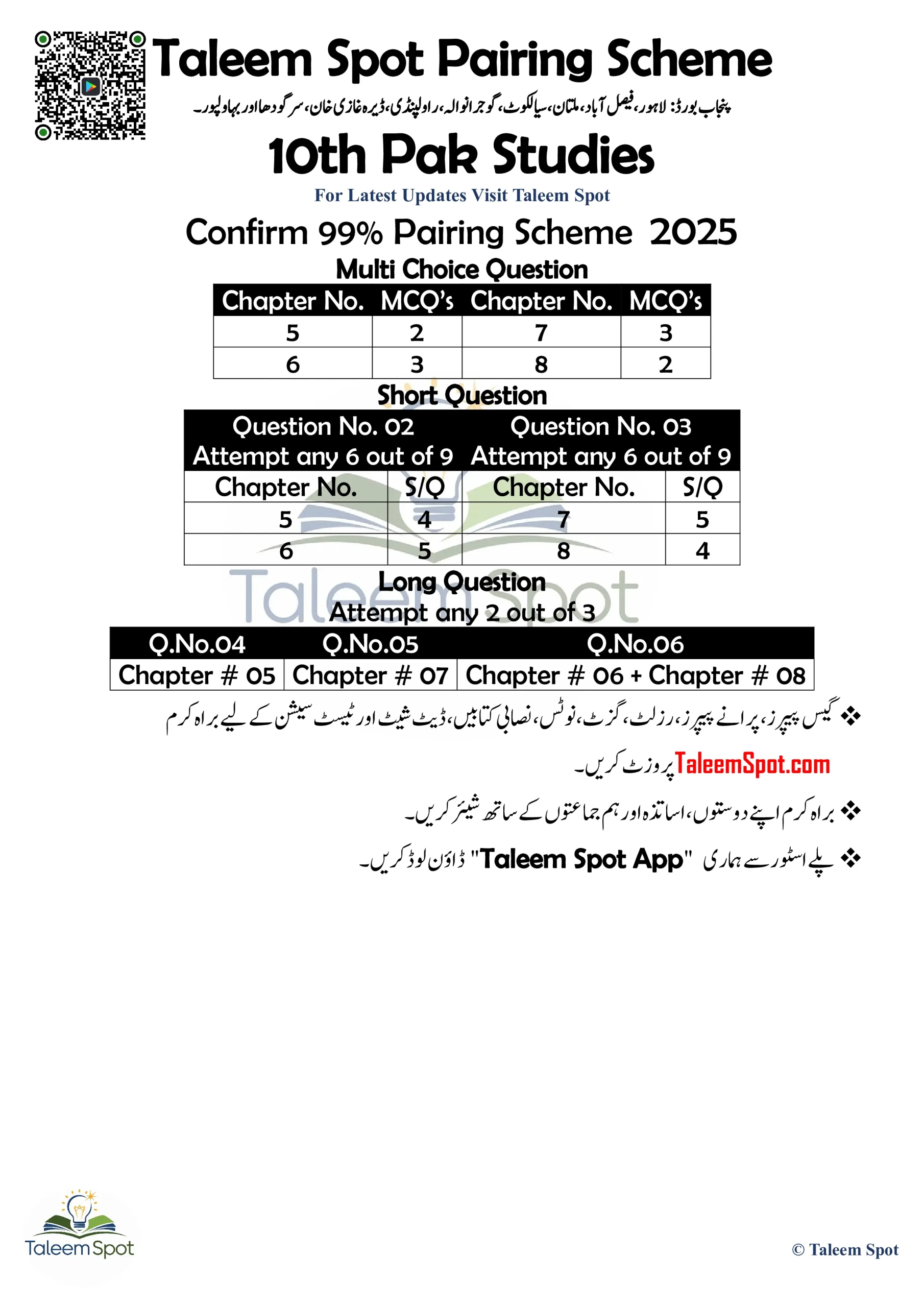10th Class Pak Studies Pairing Scheme Punjab Board 2025

The 10th Class Pak Studies Pairing Scheme Punjab Board 2025 is a vital resource for students preparing for their matriculation exams. Pak Studies is a subject that focuses on Pakistan’s history, geography, governance, and current affairs, making it an integral part of the curriculum. Students from all Punjab boards, including Lahore, Rawalpindi, Multan, Gujranwala, Faisalabad, Bahawalpur, Sahiwal, Sargodha, and Dera Ghazi Khan, rely on this pairing scheme to optimize their preparation.
Pak Studies may seem like a straightforward subject, but its emphasis on memorization and understanding makes it challenging for many students. The pairing scheme simplifies preparation by identifying important chapters and commonly asked questions. By adhering to the scheme, students can not only save time but also boost their chances of scoring high marks.

All Subjects Pairing Scheme : Visit Here
Importance of the 10th Class Pak Studies Pairing Scheme Punjab Board 2025
The 10th Class Pak Studies Pairing Scheme Punjab Board 2025 offers a clear roadmap to tackle the syllabus efficiently. It highlights key topics, ensuring that students focus on areas with higher weightage, which is essential for effective preparation.
Benefits of Using the Pak Studies Pairing Scheme
- Streamlined Preparation:
The pairing scheme divides the syllabus into manageable sections, making it easier for students to focus on high-priority topics. - Increased Efficiency:
By identifying chapters that are frequently tested, students can concentrate on studying what truly matters, saving valuable time. - Better Results:
Following the pairing scheme ensures that students cover all important topics, leading to improved performance in the exam. - Stress Reduction:
Knowing which chapters to focus on reduces exam anxiety, allowing students to prepare more confidently.
Core Areas of the 10th Class Pak Studies Syllabus
Pak Studies is divided into two main sections:
1. History and Ideology of Pakistan
This section focuses on the historical events leading to the creation of Pakistan, key leaders, and the ideology behind its formation. Topics like the Lahore Resolution, independence movements, and constitutional developments often feature prominently in exams.
2. Contemporary Issues and Geography of Pakistan
This part covers Pakistan’s geography, resources, and current affairs, including water disputes, trade, and governance structures. Maps and diagrams are frequently used to test students’ understanding.
The pairing scheme helps students prioritize specific chapters in both sections, enabling them to prepare efficiently.
Relevance of the Pairing Scheme Across Punjab Boards
The 10th Class Pak Studies Pairing Scheme Punjab Board 2025 applies to all major boards in Punjab, ensuring a standardized approach to exam preparation. Here’s how it benefits students across different boards:
1. 10th Class Pak Studies Pairing Scheme Lahore Board 2025
Lahore Board students can use the pairing scheme to focus on historically significant chapters, such as the Two-Nation Theory and constitutional milestones.
2. 10th Class Pak Studies Pairing Scheme Rawalpindi Board 2025
Rawalpindi Board emphasizes analytical questions and map-based tasks. The pairing scheme guides students toward preparing these effectively.
3. Multan Board 10th Class Pak Studies Pairing Scheme 2025
Multan Board students often face questions on geographical resources and economic issues. The pairing scheme ensures these are adequately covered.
4. Gujranwala Board 10th Class Pak Studies Pairing Scheme 2025
Gujranwala Board’s exams frequently test students’ understanding of historical events. The pairing scheme highlights these topics for focused preparation.
5. Faisalabad Board 10th Class Pak Studies Pairing Scheme 2025
For Faisalabad Board, the pairing scheme emphasizes chapters on current affairs and governance systems, which are critical for the exam.
6. Bahawalpur Board 10th Class Pak Studies Pairing Scheme 2025
Bahawalpur Board students can rely on the pairing scheme to prepare key topics related to Pakistan’s resources and regional development.
7. 10th Class Pak Studies Pairing Scheme Sahiwal Board 2025
Sahiwal Board frequently includes questions on Pakistan’s political developments. The pairing scheme ensures students cover these in detail.
8. Sargodha Board 10th Class Pak Studies Pairing Scheme 2025
Sargodha Board emphasizes map-based questions and historical analysis. The pairing scheme guides students to prepare for these effectively.
9. Dera Ghazi Khan Board 10th Class Pak Studies Pairing Scheme 2025
DG Khan Board’s exams often test students on resource management and contemporary issues. The pairing scheme helps streamline preparation for these topics.
Tips for Maximizing Preparation with the Pairing Scheme
1. Break Down the Syllabus
Use the pairing scheme to divide the syllabus into smaller sections. Focus on one section at a time for better retention.
2. Focus on High-Weightage Topics
Prioritize chapters and topics that are more likely to appear in the exam, such as Pakistan’s constitutional history and geographical resources.
3. Practice Map Work
Pak Studies often includes map-based questions. Use the pairing scheme to identify key areas for map practice, such as rivers, provinces, and resource locations.
4. Review Past Papers
Combine the pairing scheme with past papers to identify patterns in question types and frequently tested topics.
5. Make Notes
Summarize key points from each chapter for quick revision before the exam. Focus on points highlighted in the pairing scheme.
6. Test Yourself
Take mock exams or quizzes to evaluate your preparation and identify areas for improvement.
Findings
The 10th Class Pak Studies Pairing Scheme Punjab Board 2025 is an essential tool for strategic preparation. By focusing on important topics and question types, students can enhance their efficiency and improve their chances of scoring high marks. Whether you’re studying under the Lahore Board, Rawalpindi Board, Multan Board, or any other Punjab Board, this pairing scheme ensures a well-rounded and effective preparation strategy.
Pak Studies is a subject that requires both memorization and understanding. With the right approach, guided by the pairing scheme, students can tackle the syllabus confidently and excel in their exams. Start your preparation early, stick to a consistent study schedule, and let the pairing scheme guide you toward success.
FAQs
Q1: What is the purpose of the 10th Class Pak Studies Pairing Scheme Punjab Board 2025?
The pairing scheme helps students focus on high-priority topics and prepares them for the types of questions likely to appear in the exam.
Q2: Does the pairing scheme apply to all Punjab boards?
Yes, the scheme is uniform across all Punjab boards, including Lahore, Rawalpindi, Multan, and others.
Q3: What topics are emphasized in the Pak Studies pairing scheme?
Key topics include Pakistan’s history, ideology, geography, governance, and current affairs.
Q4: How does the pairing scheme improve preparation?
It streamlines preparation by highlighting important chapters and question patterns, saving time and effort.
Q5: Can the pairing scheme guarantee success?
While it doesn’t guarantee success, it significantly enhances preparation and increases the likelihood of scoring well.
Q6: Should I practice map work for the Pak Studies exam?
Yes, map-based questions are frequently included in Pak Studies exams, and practicing these is essential.
Q7: How can I access the Pak Studies pairing scheme?
You can obtain it from your school, teacher, or the official website of your respective board.
Q8: How often should I revise the syllabus using the pairing scheme?
Revise each chapter at least three times to ensure thorough preparation.
Q9: Are past papers useful along with the pairing scheme?
Absolutely. Past papers help identify question trends and reinforce preparation.
Q10: What is the best way to prepare for Pak Studies?
Combine the pairing scheme with regular revisions, map practice, and past paper analysis for comprehensive preparation.



Sir website achi hai aur ap ki pairing scheme b 100% confirm thi thank you sir..